Brass Ensemble Horn,Trombone,Trumpet,Tuba - Level 4 - Digital Download SKU: A0.1130062 Composed by English Folk Song by way of American Appalachians. Arranged by F. Leslie Smith. Celtic,Children,Folk,Irish,Traditional,Wedding. Score and parts. 28 pages. Sweetwater Brass Press #730439. Published by Sweetwater Brass Press (A0.1130062). The origins of this lullaby can be traced back to 15th-century England. Pioneers from the British Isles brought it with them to the American Appalachians. Written in three verses, its lyrics tell of four seemingly impossible gifts the singer gave my love. The first verse describes each gift: cherry that has no stone, a chicken that has no bone. a story that has no end and a baby with no cryin'. The second verse poses the riddle: how can such items exist? The third provides the answers: A cherry when it's bloomin', it has no stone. A chicken when it's pippin', it has no bone. The story of I love you, it has no end. A baby when it's sleepin', has no cryin'. This Riddle Song has enjoyed somewhat of a revival since mid-20th century, making appearances in various movies, TV shows and recordings. In 1956, Jerry Livingston and Paul Francis adapted The Riddle Song tune, added an original bridge and created new lyrics; Johnny Mathis recorded it as The Twelfth of Never, giving the haunting melody probably its greatest surge in popularity. This arrangement is in G major and opens with an upbeat introduction. For the first statement of the melody, tempo slows and Trumpets alternate the lead. On the second time through, tempo speeds up slightly and tuba takes the lead. For the third, tempo is back to the opening speed and Horn in F plays the melody. On the fourth time through, Trumpets and Trombone frame the tune in a call-and-response form. In the fifth, Trombone takes the lead. In the sixth and final statement, Horn in F and Trombone play melody at half speed while Trumpets play a fairly complicated counterpoint (at what may seem like double speed!). This, until the last phrase (A baby when it's sleepin'), when the melody switches over to Trumpets and Trombone takes the counterpoint. Trumpet 1 plays its A above the staff a number of times. Tuba's lowest note is its F down below the staff. Otherwise, notes for all instruments are well within normal playing range. Because of the recommended tempo, the countermelody at measures 68-83 could be problematic for Trumpets and Trombone and may require a little extra work. Completed in 2022, performance time runs about 3 minutes, 42 seconds. The arranger, Les Smith, will be happy to provide substitute parts (for example, treble clef baritone for trombone) at no charge. He would like to receive your suggestions, comments, corrections and criticisms. For more arrangements by Les, enter Sweetwater Brass Press (without the quotation marks) in the Sheet Music Plus or Sheet Music Direct search box. (Also, purchase of this piece entitles you to your choice of another of his arrangements at no charge; send a copy of your purchase receipt directly to him at lessmith61@bellsouth.net.)
